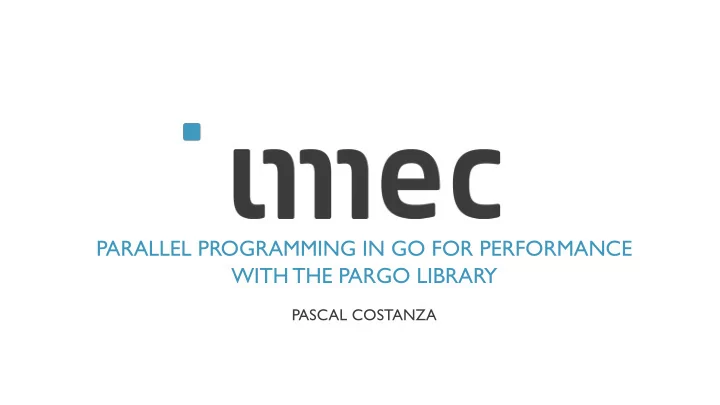

PARALLEL PROGRAMMING IN GO FOR PERFORMANCE WITH THE PARGO LIBRARY PASCAL COSTANZA
WHAT IS PARGO? Pargo is a library for parallel programming in Go at imec’s ExaScience Lab: § § based on our experiences with parallel programming in C++, Common Lisp, and Java § released under a BSD-style open source license at https://github.com/exascience/pargo Pargo supports numerous common parallel programming patterns: § § Divide-and-conquer task-based parallelism § Parallel ranges, parallel reduction, parallel Boolean functions § Speculative parallelism § Parallel Quicksort and Mergesort § Parallel hash table § Parallel pipelines inspired by Java Parallel Streams introduced in JDK 8 § including support for contexts, cancellation, and Go-style error handling 2
CONCURRENCY VS. PARALLELISM § Concurrency is part of the problem domain. § Parallelism is part of the solution domain. § Needs solution even without multicore/node. § Only needed for performance. § Go is really good at this! § Pargo is really good at this! ;) https://xkcd.com/726/ Gary W. Sabot, The Paralation Model, The MIT Press, 1988 3
PARALLEL PROGRAMMING: AN EXAMPLE 4
PARALLEL PROGRAMMING: AN EXAMPLE 5
PARALLEL PROGRAMMING: AN EXAMPLE 6
PARALLEL PROGRAMMING: AN EXAMPLE 7
PARALLEL PROGRAMMING: AN EXAMPLE 8
PARALLEL PROGRAMMING: AN EXAMPLE 9
PARALLEL PROGRAMMING: AN EXAMPLE 10
DIVIDE-AND-CONQUER TASK-BASED PARALLELISM sum[0:32] sum[0:16] sum[16:32] sum[0:8] sum[8:16] sum[16:24] sum[24:32] sum[0:4] sum[4:8] sum[8:12] sum[12:16] sum[16:20] sum[20:24] sum[24:28] sum[28:32] sum[0:2] sum[2:4] sum[4:6] sum[6:8] sum[8:10] sum[10:12] sum[12:14] sum[14:16] sum[16:18] sum[18:20] sum[20:22] sum[22:24] sum[24:26] sum[26;28] sum[28:30] sum[30:32] 11
DIVIDE-AND-CONQUER TASK-BASED PARALLELISM 12
DIVIDE-AND-CONQUER TASK-BASED PARALLELISM WITH 16 CORES 13
DIVIDE-AND-CONQUER TASK-BASED PARALLELISM WITH 4 CORES 14
DIVIDE-AND-CONQUER TASK-BASED PARALLELISM WITH LOAD IMBALANCE 15
DIVIDE-AND-CONQUER TASK-BASED PARALLELISM § Task-based parallelism allows flexible distribution of work over CPU cores. § Distributing work evenly over cores is often not optimal, because of load imbalance. 16
DIVIDE-AND-CONQUER TASK-BASED PARALLELISM § Task-based parallelism allows flexible distribution of work over CPU cores. § …but how are tasks actually scheduled over the cores? 17
WORK STEALING § Work stealing is known to be optimal both in theory and practice Blumofe, Leiserson: Scheduling Multithreaded Computations by Work Stealing, § Journal of the ACM, 1999 Frigo, Leiserson, Randall: The Implementation of the Cilk-5 Multithreaded Language, PLDI’98 § § Successfully implemented in many languages and libraries: Cilk for C;Threading Building Blocks for C++; Java fork/join; … § …and Go § Wonder Gopher by Ashley McNamara, https://github.com/ashleymcnamara/gophers 18
WORK STEALING FINDS OPTIMAL DISTRIBUTION ON THE FLY 19
PARALLEL PROGRAMMING: AN EXAMPLE 20
THE EXAMPLE PROGRAM IN PARGO 21
THE EXAMPLE PROGRAM IN PARGO 22
THE EXAMPLE PROGRAM IN PARGO 23
THE EXAMPLE PROGRAM IN PARGO 24
…AND LOTS OF OTHER PARALLEL PROGRAMMING PATTERNS Parallel Do § Parallel range § § Parallel reduction over int, float64, string, interface{} Parallel range reduction over int, float64, string, interface{} § Parallel And, Or, RangeAnd, RangeOr § § Speculative variants of many of the above functions Sequential variants for debugging § Parallel Quicksort and merge sort § § A parallel hash table (similar to Go’s sync.Map) …and parallel pipelines. § 25
CONCURRENT PIPELINES IN GO 26
CONCURRENT PIPELINES IN GO 27
CONCURRENT PIPELINES IN GO 28
CONCURRENT PIPELINES IN GO 29
PARALLEL PIPELINES USING PARGO 30
PARALLEL PIPELINES USING PARGO 31
PARALLEL PIPELINES USING PARGO 32
PARALLEL PIPELINES USING PARGO 33
PARALLEL PIPELINES USING PARGO 34
PARALLEL PIPELINES IN PARGO § Predefined pipeline sources for arrays, slices, strings, channels, and bufio.Scanner. Support for user-defined sources through the pipeline.Source interface. § § Support for several kinds of nodes (stages): § Sequential, ordered, parallel § Strictly ordered, limited parallel § Skip and Limit nodes Support for several kinds of filters: § § Generic receive and finalize § Boolean filters: Every, Some, NotEvery, NotAny § Counting filter § Slice filter § Support for contexts, including cancellation § Support for error handling, including cancellation on error Support for fine-tuning of batch sizes § 35
ELPREP: A HIGH-PERFORMANCE TOOL FOR SEQUENCING High-performance tool for preparing SAM § files for variant calling. § Multi-threaded application that runs entirely in RAM and merges multiple steps to avoid repeated file I/O. § Can improve performance by a factor of up sort by coordinates filter unmapped reads mark duplicates add read groups filter sequence dictionary merged to x10 compared to standard tools. Picard/Samtools elPrep § elPrep implemented in Go since version 3.0 § https://github.com/exascience/elprep elPrep (merged) elPrep (max RAM) elPrep (max RAM + merged) 0 20m 40m 1h 1h 20m 1h 40m 2h Go Gopher image by Renee French, CC BY 3.0, https://creativecommons.org/licenses/by/3.0/
PARGO § Pargo available at https://github.com/exascience/pargo § Documentation: https://godoc.org/github.com/exascience/pargo § More documentation: https://github.com/exascience/pargo/wiki § elPrep: https://github.com/exascience/elprep 37
38
Recommend
More recommend